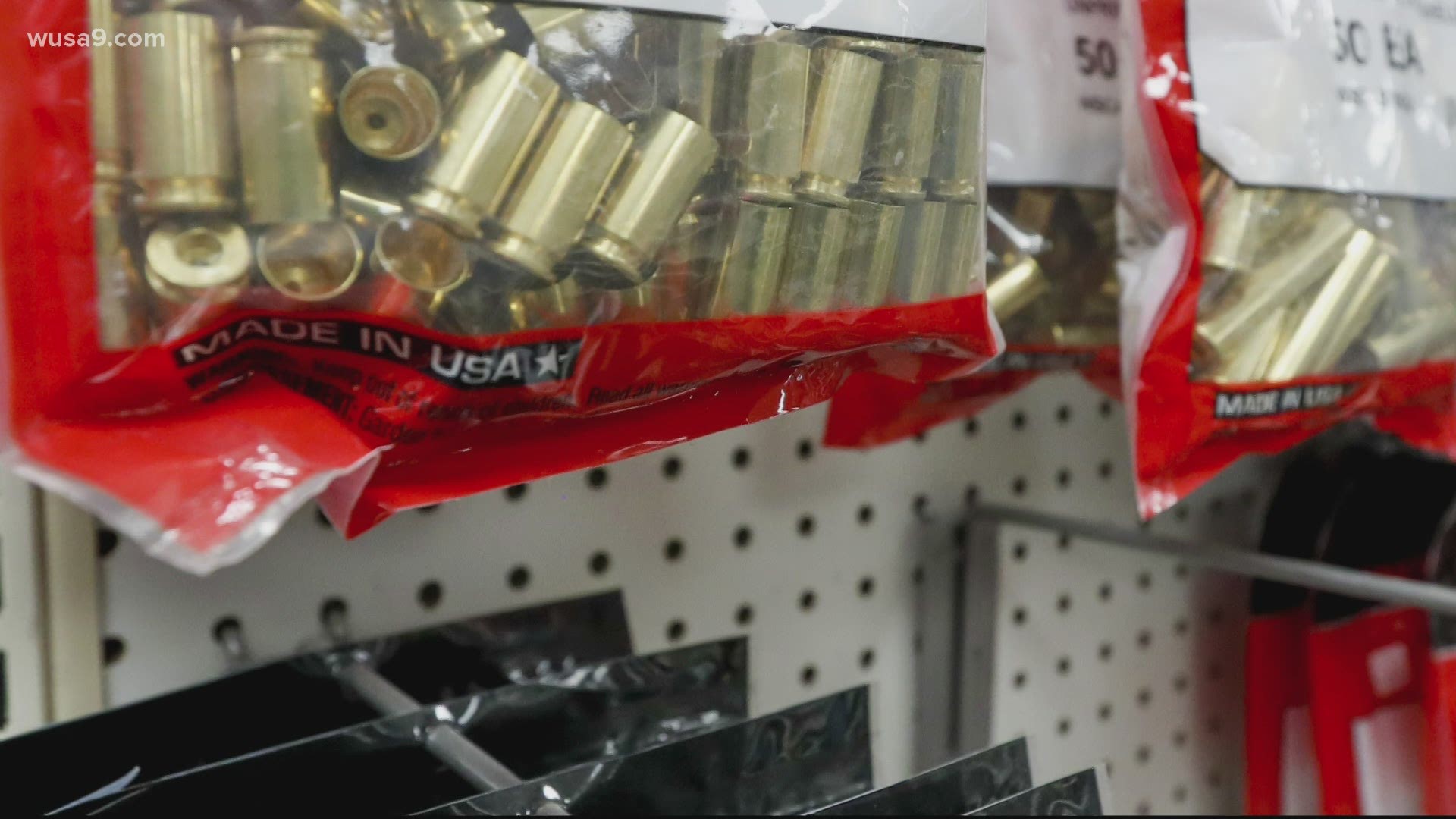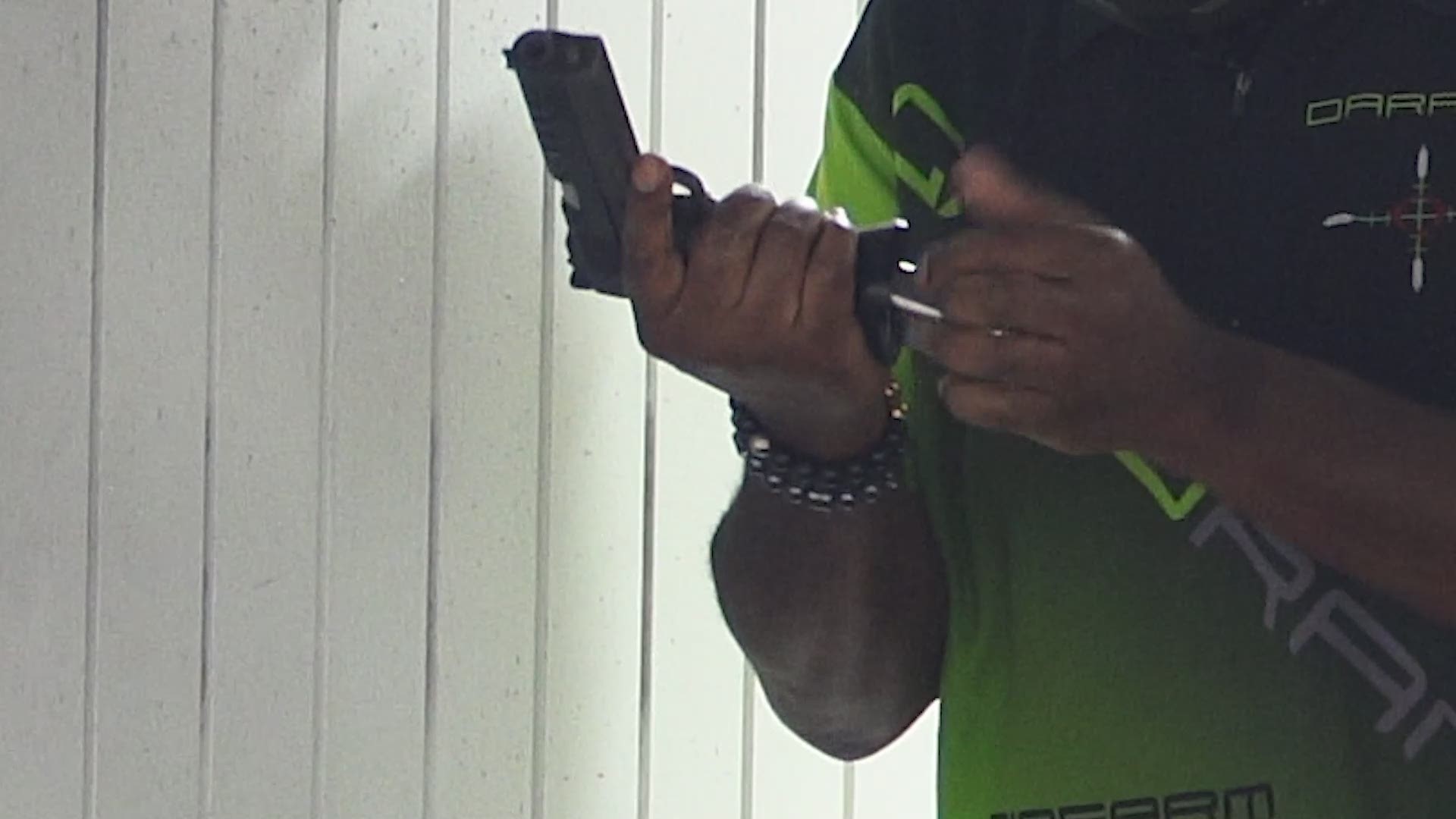WASHINGTON — A Virginia gun owner told us a gun without bullets is just a hammer. And when ammunition supply can't catch up with demand, you end up with a lot of hammers.
Step into most gun stores these days and you'll be hard-pressed to find full shelves of firearm ammo. You're more likely to find them sparse and with their price tags jacked up more than 100%. A year ago, the outlook was bleaker. That's because the United States saw record levels of gun purchases in 2020.
The FBI reported a 40% increase in the amount of firearm background checks from 2019 to 2020. The National Shooting Sports Foundation estimates about 8.4 million of those were first-time gun owners.
The trend hasn't let up in 2021. FBI data shows 12,452,319 background checks just in the first quarter, January through March. Pandemic lockdowns, social unrest, a fraught presidential election and an insurrection all appear to have caused spikes in gun buying habits compared to years past.
"You couldn't go to Walmart and find anything (ammo) on the shelves. They were completely barren," said Dave Simmons, a firearms safety trainer in West Virginia and Maryland.
Simmons says the uncertainty at the start of the pandemic about possible food and supplies shortages drove demand.
"People were getting anxious...and they wanted guns to defend themselves," said Simmons.
Empty ammunition shelves became their own cause for anxiety, and conspiracy theories started spreading on social media about who could really be behind the shortage. So VERIFY searched for the answers.
THE QUESTION
Is the government causing an artificial firearm ammunition shortage to keep bullets from law-abiding Americans?
THE ANSWER
No. The shortage is driven by unprecedented demand, and to a lesser extent, hoarding and panic buying.
WHAT WE FOUND
Remember the Toilet Paper Crisis of March 2020? The ammo shortage is basically the same, partially driven by hoarding and panic buying, according to Lawrence Keane.
Keane is General Counsel and Senior Vice President for Government and Public Affairs at the National Shooting Sports Foundation (NSSF). NSSF is a firearm industry trade association and gun rights lobbying group based in Newtown, Connecticut.
"It kind of becomes a self-fulfilling prophecy," Keane said. "Like the toilet paper last year, they grab as much as they can as fast as they can, because they're not sure when they'll be able to get it in the future."
Keane told us outright that the conspiracy theory that the government is behind the shortage is just that, a conspiracy theory, with no factual backing.
"Let me just say categorically, that is not true," Keane said. "That is fake news...if you will.”
The gun enthusiasts we spoke with for this story all said they were familiar with the theory and had heard it from others, but told us there is no truth to it.
A spokesperson for the U.S. Army told us they haven't had any significant ammunition supply chain issues, explaining most of their supply comes from manufacturing and contracts isolated from civilian ammo supply.
Shawn Poulin owns NOVA Armory in Arlington, Virginia. He tells us he believes people are hoarding ammunition, and drew the same parallels to toilet paper when explaining the buying habits he's witnessed.
"We don't see people buying it just to have one or two boxes," Poulin said. "They want maybe five or six boxes, at the minimal level, for any particular reason."
According to firearms trainer Dave Simmons, people are not necessarily hoarding, but "preparing excessively." Simmons told us he believes there are people out there who believe in online conspiracies that a civil war is imminent, and they need to prepare for it.
"It's the same thing with toilet paper," he explained. "When stuff gets messy you're gonna need a lot of it."
But outside of doomsday preppers, some gun owners we talked to told us it's not uncommon for a regular shooter to have a couple of thousand rounds on hand for trips to the range.
"1,000 rounds of AR-15 ammo is normally two to two and a half trips to the range. It's literally not that much," Alex Rozental told us. He's a co-owner of AM Shooting in Damascus, Maryland. He says even he bought ammo in bulk pre-shortage.
But gun-control advocates say this is a cause for concern.
Ammunition is largely unregulated in the U.S., and there are no federal restrictions on how much you can buy at once. On top of that, no one is keeping track of how much ammo is out there sitting in basements, including the Bureau of Alcohol, Tobacco, Firearms and Explosives.
NSSF estimates at least 12 billion rounds of ammunition are manufactured annually in the United States. After its purchased, there's no way to track where it goes.
Chelsea Parsons is Vice President of Gun Violence Prevention at the Center for American Progress. And she is concerned about the danger that can come with ammunition bulk purchasing and stockpiling.
"It is not appropriate to be able to buy an unlimited quantity of AR-15 ammunition online with no paperwork kept and no verification that the individual buying it is even legally eligible to possess it in the first place," Parsons said. "And we know from some of the bigger, more high profile mass shootings, a lot of those perpetrators had a lot of rounds on them."
YouTube videos proudly show off massive ammunition stockpiles. To non-gun owners, the visuals of tens of thousands of rounds of ammunition can be shocking. But Keane stresses that this is not only constitutional but is normal for many gun owners.
"I have many, many firearms because they serve different purposes," and each individual gun requires a different kind of ammo, Keane explained. "It's not at all unusual, and I have friends who have literally thousands and thousands of rounds of ammunition that they own for different purposes."
So we can verify, it is categorically untrue that the U.S. government manufactured an ammunition shortage. Instead, it is driven by massive market factors and general anxiety about where that next box of ammo will come from.


